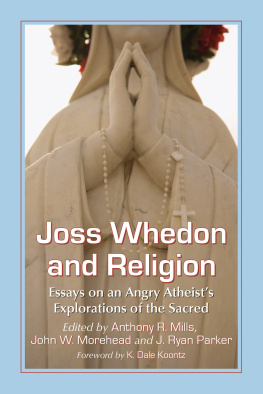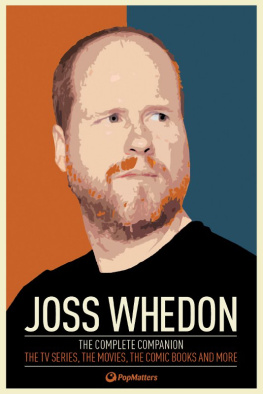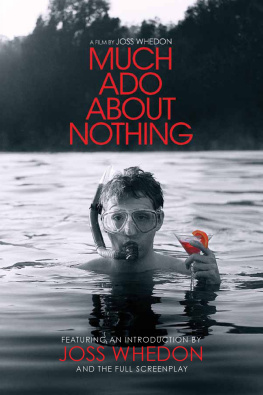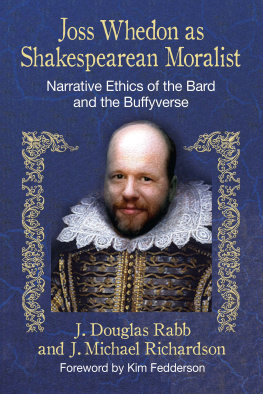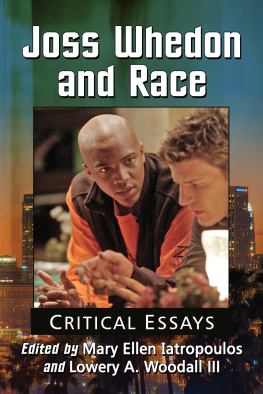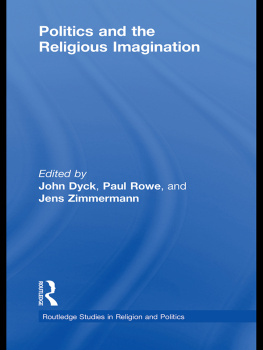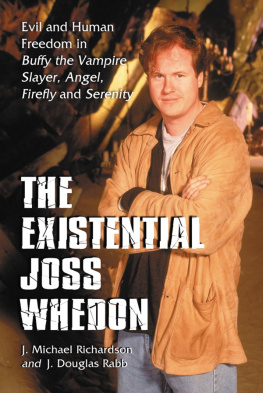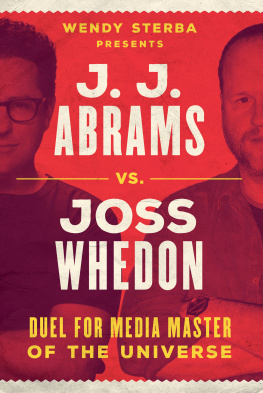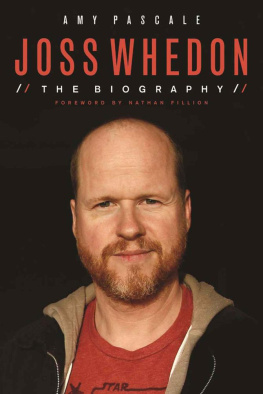
JOSS WHEDON AND RELIGION
Essays on an Angry Atheists Explorations of the Sacred
Edited by Anthony R. Mills, John W. Morehead and J. Ryan Parker
Foreword by K. Dale Koontz

McFarland & Company, Inc., Publishers
Jefferson, North Carolina, and London
LIBRARY OF CONGRESS CATALOGUING DATA ARE AVAILABLE
BRITISH LIBRARY CATALOGUING DATA ARE AVAILABLE
e-ISBN: 978-1-4766-1253-9
2013 Anthony R. Mills, John W. Morehead and J. Ryan Parker. All rights reserved
No part of this book may be reproduced or transmitted in any form or by any means, electronic or mechanical, including photocopying or recording, or by any information storage and retrieval system, without permission in writing from the publisher.
Front cover image Design Pics/Thinkstock
McFarland & Company, Inc., Publishers
Box 611, Jefferson, North Carolina 28640
www.mcfarlandpub.com
Foreword
K. DALE KOONTZ
I can tell you exactly where I was when I rst encountered Buffy the Vampire SlayerI can even tell you which episode was airing. (If youre curious, I was in Greenville, South Carolina, and it was the early fall of 1998. The episode was Becoming: Part 2.) I was marked from that moment. Seldom, if ever, has a television show had such an immediate impact on me. I really cared about these characters. I was entranced by the elaborate mythology that had been spun for this world. I adored the sharp dialogue. In short, this show was amazing, yet it wasnt a blockbuster in the ratings. How could that be? Surely I couldnt be the only person who felt this connectionwhere were the fans of this incredible show?
It turned out that they were all around me. I quickly found a cadre of fans who were passionate about the show and, as legions of Whedonians can attest (or Whedonists ... theres a debate, but I do not anticipate an outright schism), thats a warm and welcoming circle. But I also quickly found myself looking ever deeper into the show. As much as I enjoyed the annual Big Bad and the crisp one-liners, I was drawn to the larger themes which ran throughout the show, leaping easily from season to season. These were important themes, toofar more lasting than Buffys style choices (remember that awful crimped hair? Shudder.). Buffy tackled Big Questionsredemption, grace, community, loss, destiny, and free will were only a few of the issues that received attention throughout the run of the show. Ive speculated before that one of the reasons Buffy was able to explore these issues was that it was a little show on a start-up netlet with a silly title. In this case, ying under the radar had denite advantages.
Whedons interest with these issues didnt end with Buffy. As his body of work developed, he has continued to wrestle with these Big Questions throughout his work. Angel and Firey both feature ensemble casts of characters trying to nd signicant meaning in a society that often seems cold, uncaring, and directionless. Fireys untimely cancellation led to Serenity, which gave Whedon a larger screen on which to play out his concepts of control, choice, and consequences. The 20072008 writers strike led to Whedon exploring webcasting and the result, Dr. Horribles Sing-Along Blog, showed that Whedons gift for storytelling could exist over the Internet and that his catchy, Sondheim-inuenced tunes could grip our hearts. With his return to the small screen in 2009 with Dollhouse, Whedon had a new playground for his ideas regarding feminism, power, and identity. He also continued the slayer story with his work on the graphic novel Fray and he has continued to work in the comic book eld, sometimes with his own creations and sometimes playing in someone elses sandboxmost notably, with his run on Marvels Astonishing X-Men.
Then came 2012, which in retrospect can be termed the year of Whedon. Several years prior, he had cowritten and produced The Cabin in the Woods, but the lm had languished in MGMs vaults as the studio struggled to overcome bankruptcy. Ultimately, the lm was released by Lionsgate in April of 2012 and proceeded to turn the horror lm genre inside out, albeit in a good way. Possibly Whedons most overt exploration of free will, Cabin quickly became a critical darling. A few weeks later, Marvels The Avengers was released. This lm was a monumental undertaking, involving as it did a large ensemble cast of characters, four of whom had already had stand-alone lms and all needed to be integrated into a cohesive whole. One of Whedons hallmarks has long been crafting scripts centering on just how a disparate group of individuals manages to set aside their sizable differences and come together to craft a strong community, and this was a major theme in Whedons script. He knows how to play to his strengths and the box ofce receipts (currently well in excess of $1.5 billion worldwide) bore that out.
At the beginning, I mentioned that Buffy had an immediate impact on me. I should mention that it also had a lasting impact on me, as the show was my launch pad into what is known as Whedon studies. Beginning early in the run of Buffy, academics noticed the show and they ocked to the richness of the text. There was something in here for nearly any disciplinegender studies, media studies, sociology, psychology, and philosophy scholars all used the lenses of their own areas of study to view Buffy as well as Whedons other shows, as they came along.
I entered this arena to answer one seemingly simple question: Why would someone who so adamantly professed himself to be an atheist spend so much time grappling with issues that are often associated with faith in the unseen and unknown? After all, you cant watch three hours of Whedons work without rubbing up against questions of redemption and grace, examining an expansive denition of family, or confronting the perils of blind zealotry. My writings in this area led me to delve more deeply into Whedons shows and I have been fortunate indeed to present academic papers and publish on Whedons work for a number of years now. One result of my ongoing interest was Faith and Choice in the Works of Joss Whedon, a book that explores the seeming contradiction of an atheist examining these concepts.
As proud as I am of Faith and Choice (and I think it would make quite a handsome companion volume to the book you hold in your hands), it didnt answer all of my questions, and Whedons work since its publication in 2008 has raised additional questions. This is why Im so pleased that Tony, John, and Ryan have collected the essays youre about to read.
In contemporary American society, the very word religion often seems to be used to narrow and exclude, rather than to celebrate and include. I am rmly of the Big Tent belief which states that deeper examination generally leads to the discovery of common ground and a greater understanding of other worldviews. This book is a Big Tent book. The authors come at their individual topics from a wide variety of angles, but all are concerned with clarifying their opinions and explaining their viewpoints. You may not agree with all of them, but I feel condent that the essays contained here will spark the res of your mind and get you to thinking, which is seldom a bad thing.
Whedons output is extensive and I can only marvel at the sheer mountain of effort this book represents. Trying to be comprehensive when your subjects productions span the multiple media platforms of television, lm, webcasts, and comic books is an immense task. I dont envy the editors the task they took on, but I know Im glad that they shouldered the burden, for the result is a worthy addition to the elds of both religious studies and Whedon studies.
Next page
